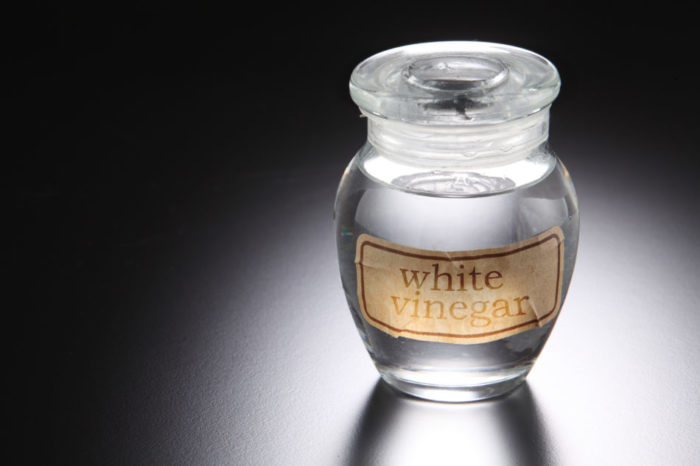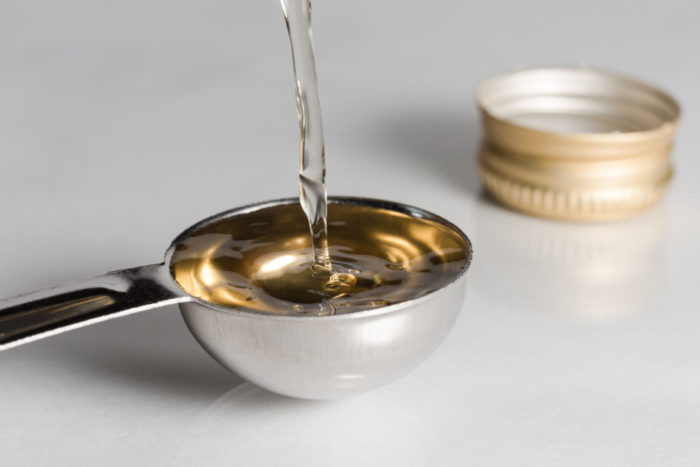Let’s consider the key points to look at in a comparison of white vinegar vs white wine vinegar. Some people may wonder: is white wine vinegar the same as white vinegar? Well. even though these products are similar in color, name, and belong to the same variety of food (vinegar), they are quite different.
Generally speaking, both these types of vinegar have different properties and tastes. They are not easily substituted for each other and have rather different uses. They sport differences in taste, origin, flavor, and aroma. In fact, though these types of vinegar show some similarities in naming and color, they are remarkably different from each other in culinary properties.
Let’s see how they compare.


White Vinegar vs White Wine Vinegar
Differences Between White Wine Vinegar And White Vinegar
Both these products are very different despite the similarity of their name and color. The biggest similarity between them is that they’re types of vinegar! Other than that, these are both very different products with stark differences in taste, flavor, and more.
White vinegar has a rather pronounced sour and sharp flavor. Its smell is rather evident and fairly strong. On the other hand, white wine vinegar is fairly mild and has a bit of a sweet taste with floral and fruity flavors.
All types of vinegar contain acetic acid, it’s pretty much the defining substance for any vinegar. Standard white vinegar conventionally has 5 to 10% acetic acid.
While this gives it a strong flavor for use with foods, it also makes white vinegar a suitable cleaning agent. It can clean and disinfect floors or tiles and is often the recommended cleaning agent for appliances like coffee machines.
Given its proficiency in cleaning and disinfecting, there are easily available industrial strength variants for this vinegar. This can include those with up to 75% acetic acid. Clearly, this type of white vinegar isn’t meant for cooking. Be careful and read the label when purchasing to make sure you have a food-suitable white vinegar.
White wine vinegar is milder, though it has a similar acid content at 4-7%. Keep in mind, it’s required that a commercial vinegar has at least 4% acid content.
Finally, there is a difference in the origin. White vinegar comes from processing grain alcohol.
White wine vinegar, as the name implies, comes from processing white wine. As bacteria processes the alcohol in the wine, it turns to vinegar. Interestingly, this process is also the reason why improperly stored wines or alcohol get vinegarized and develop a sour taste.
On The Flavor Profile And Acidity Of White Wine Vinegar
Even though white wine vinegar has pretty much the same acid content as white vinegar, it gets the description of having a milder taste. This might seem paradoxical, but it makes better sense when you take a closer look at the whole picture. What gives white wine its milder flavor is its origins.
White wine manages to hold on to some of its original characteristics and flavors during vinegarization. Having a touch of the original grapes flavor in the wine helps hold against the sharp flavor of the acid. This gives the vinegar a fruity flavor and helps it feel milder than white vinegar. Other options like red wine vinegar and champagne vinegar show similar characteristics.
Some Different Types Of Vinegar
There are many types of vinegar and they find excellent use in the culinary world. Some, like white vinegar and balsamic vinegar are well-known. Others like champagne vinegar and apricot vinegar lack the fame.
Here’s a list of a few types of vinegar. Due to the nature of this topic, this list isn’t exhaustive.
- White vinegar (distilled white vinegar)
- White wine vinegar
- Apple cider vinegar
- Champagne vinegar
- Balsamic vinegar
- Sherry vinegar
- Apricot vinegar
- Beer vinegar
- Rice vinegar
- Red wine vinegar
- Malt vinegar
FAQ And Related Points
Where Can I Use These Vinegars In Recipes?
So, where can we use white vinegar and white wine vinegar?
As already noted, white vinegar is good for disinfecting, cleaning, and even descaling kitchen appliances. It’s as versatile in its culinary uses as well. Use white vinegar when making ketchup, salad dressings, and more. Several recipes call for the use of white vinegar.
White wine vinegar is another useful and versatile ingredient for the kitchen. Since it has a similar acidity to distilled vinegar, it might be useful for descaling and cleaning, but that’s not really a wise use for this ingredient.
Put its fruity flavors to good use for your culinary requirements. It does wonders with chicken, fish, salad dressing, soups, and even pickles. You’ll also find several other recipes calling for this vinegar.
Can I Replace White Vinegar For White Wine Vinegar When Cooking?
Despite their perceived similarities, these two vinegars are different enough that they cannot be used interchangeably in cooking. White wine vinegar is not a very common ingredient and is unlikely to be available in most homes. In fact, you’d have to try some big box store or online shopping to get hold of this ingredient. Conversely, plain distilled vinegar is readily available and is often stored in the pantry or home of most people.
If you run out of one of these ingredients while cooking, you might find yourself tempted to simply swap one kind of vinegar with the other. That won’t be a good idea.
One obvious reason for this is that they are very different ingredients and generally it isn’t suitable to substitute White Vinegar for White Wine Vinegar. Substitutions require a better compatibility between the ingredients or at the very least, a similar flavor and taste. After all, distilled vinegar has a sharp and sour flavor, while white wine vinegar is milder, with fruity notes and sweet undertones.
Given their difference in flavors, substituting one type of vinegar for the other may cause significant change in the recipe. Some recipes might be more resilient than others, but there will be a clear change with substitution.
Are White Wine Vinegar And Distilled White Vinegar The Same?
Distilled white vinegar is another name for white vinegar. As we know, this type of vinegar is very different from white wine vinegar. Perhaps it is the association that people make with the words distilled and wine that encourages a similarity between these vinegars. However, it is clear that both these types of vinegar have very different properties and are usually applied in different recipes.
What Is The Shelf Life And Storage Life Of White Wine Vinegar?
If stored properly, white wine vinegar can last a very long time. This means it should be stored in an airtight container in a cool and dark place. Many manufacturers put a “best by” or expiration date on the product. In the case of products like white wine vinegar, this is a mere formality.
One could say that the product would have its best flavors until the “use by” or “best by” dates. Although, if stored properly, this vinegar will stay good to use for several years.
It’s worth noting that if stored improperly, the fermentation in white wine vinegar might continue. If it feels like the vinegar is overly sour or has a bad smell, throw it away without consuming it.
How Is White Cooking Wine Different From White Wine VInegar?
By their very definition, both these products are inherently different from each other, even if they share some points. Though the vinegar is derived from white wine, it does not include any alcohol. That alone should count as a major difference to seal this deal, but as things stand, it’s not the only key property separating these two popular ingredients.
Besides, white cooking wine often includes a fair amount of salt and preservatives. None of these ingredients are present in conventional white wine, or the associated vinegar.
The Bottom Line
Though they are both important parts of cooking and seem like they would be similar, white vinegar vs white wine vinegar comparison shows how different they are. They differ in aspects related to taste, flavor, origin, and even their culinary uses.
For most recipes, you shouldn’t use white wine vinegar and white vinegar interchangeably. These are very different products and each works rather wonderfully within its conventional uses.
